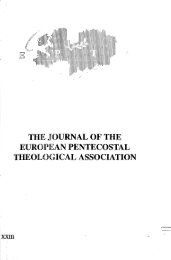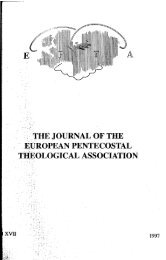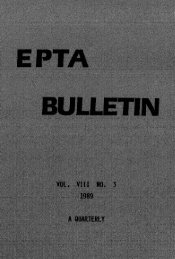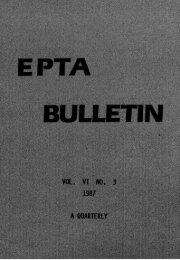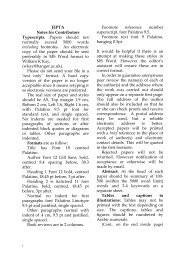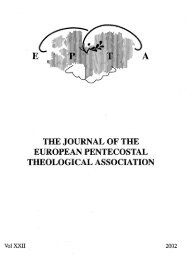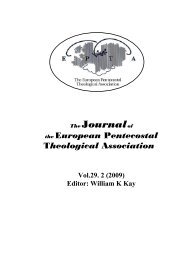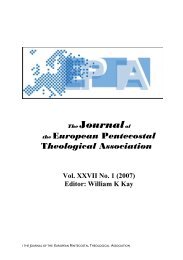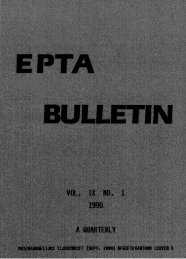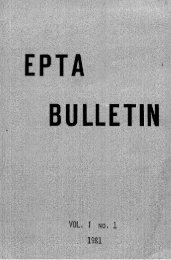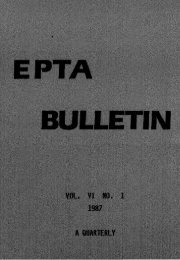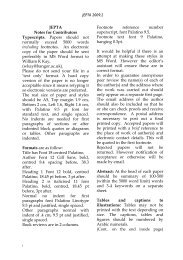jepta 2001 21 - European Pentecostal Theological Association
jepta 2001 21 - European Pentecostal Theological Association
jepta 2001 21 - European Pentecostal Theological Association
Create successful ePaper yourself
Turn your PDF publications into a flip-book with our unique Google optimized e-Paper software.
The Journal of the <strong>European</strong> <strong>Pentecostal</strong> <strong>Theological</strong> <strong>Association</strong>, Vol. XXI, <strong>2001</strong><br />
connection with Church-growth theories, or to missiology.' Ironically, the sizable<br />
entry on the "Theology of the Church" in the Dictionary of <strong>Pentecostal</strong> and<br />
Churismatic Movements was written by a Catholic!' To me the situation is crystal<br />
clear:<br />
The development of a solid ecclesiology from a <strong>Pentecostal</strong> perspective is a<br />
theological desideratum. But that does not exhaust the necessity. It is important<br />
for the sustenance and further development of existing <strong>Pentecostal</strong> Churches (i.e.,<br />
for the life of <strong>Pentecostal</strong> Churches) that they develop a keen spiritual awareness<br />
of what the Church actually is, and spell it out in theological statements.'<br />
<strong>Pentecostal</strong> perspectives on the Church are diverse. Hocken, too, notes that much<br />
ecclesiological reflection has been completed within the framework of the<br />
question of authority in the Church. Apparently, this reflection has not led to the<br />
development of a <strong>Pentecostal</strong> position on the subject, since all traditional forms<br />
of Church government can be found among Pentec~stals.~ Because of the strong<br />
restorationist' stance, there is an immediate reference back to the New Testament<br />
passages. As in so many official Catholic documents, proof-texting seems to be<br />
the favoured method of interpreting scripture in <strong>Pentecostal</strong> documents. It can<br />
only be hoped that the authors who do this are sufficiently aware of the danger of<br />
reading back modem Church practices and convictions into texts stemming from<br />
another period that were written for purposes other than formulating a body of<br />
doctrines.<br />
Traditionally, ecclesiological reflection has been far removed from the<br />
theological centre of <strong>Pentecostal</strong>ism. The overriding theological categories of<br />
<strong>Pentecostal</strong> Theology rather stem from soteriology and not from eccle~iology.~<br />
The salvation of (individual) believers is the central concern for <strong>Pentecostal</strong>s. In<br />
this line, the Church is typically seen as an assembly of 'born-again' (and<br />
preferably 'Spirit-filled') believers. The reasons for organizing local assemblies<br />
were more often than not pragmatic: since the experience of the baptism with the<br />
' Melvin L. Hodges, A Theology of the Church and its Mission; A <strong>Pentecostal</strong> Perspective,<br />
Springfield: Gospel Publishing House, 1977.<br />
' Hocken, "Church", <strong>21</strong> 1-<strong>21</strong>5,<strong>21</strong>7-<strong>21</strong>8.<br />
If only to avoid falling prey to management theories borrowed from secular business-science.<br />
' See Hocken, "Church", <strong>21</strong>3.<br />
"his characterization is also used by Harold D. Hunter, "'Wij zijn de kerk': nieuw congregationalisme.<br />
De visie van de Pinksterbeweging", Concilum Wterbewa) 1996-3: <strong>21</strong>-26<br />
(American Edition: J rgen Moltman, Karl Josef Kuschel (eds.), <strong>Pentecostal</strong> Movements as an<br />
Ecumenical Challenge, Maryknoll: Orbis Books, 1996), 22. Also noted by Hocken, "Church",<br />
<strong>21</strong>2-<strong>21</strong>3.<br />
AS far as I can see, pneumatology in this connection does not occupy this prismatic place.<br />
Pneumatology is rather built upon a soteriological basis.<br />
The Place of the Church in the Economy of Salvation. Roman Catholic and<br />
<strong>Pentecostal</strong> Perspectives: Room for Rapprochement Huibert Zegwaart<br />
Holy Spirit was not embraced by the existing denominations' and Early<br />
<strong>Pentecostal</strong>s were often expelled from the churches they loved and sought to<br />
revive, <strong>Pentecostal</strong> congregations were formed for pastoral and practical reasons.'<br />
This pattern is also in evidence when it comes to the formation of national<br />
denominations. Practical concerns, rather than theological ones dominate here.<br />
Within the <strong>Pentecostal</strong> tradition, theological reflection does not typically stand on<br />
its own. It is often a response to practical issues that arise. Thus, ecclesiological<br />
reflection largely takes place in the context of problems over Church leadership.<br />
Hence, theological reflection largely focuses on questions of Church government.<br />
The positions adopted are usually those current in Evangeli~alism.~ That means<br />
that the views of the Church current within <strong>Pentecostal</strong>ism are mostly inherited,<br />
and not "h~megrown".~<br />
PRACTICAL CONSEQUENCES OF PENTECOSTAL VIEWS ON THE<br />
CHURCH<br />
Having established the peripheral nature of theological reflection upon the<br />
Church within <strong>Pentecostal</strong>ism and that its content is by and large inherited from<br />
elsewhere, we need not concern ourselves here with specific contents. Instead, we<br />
can turn to issues connected to ecclesiology, such as evangelization and missions;<br />
proselytism; the invisible Church; and the priesthood of all believers.<br />
The question of evangelization and missions have from the earliest times onward<br />
ranked high on the priority list of <strong>Pentecostal</strong>s.' Unlike Catholics, who for a<br />
sizable part of their history of missions, came on the bandwagon of conquerors<br />
and victors, often building Churches and establishing some form of official<br />
presence of the Church before there were actual ~onverts,~ <strong>Pentecostal</strong>s often<br />
' The exception would be the Church of God and the Church of God of Prophecy both of which<br />
have their headquarters in Cleveland, Tennessee.<br />
Thus, in Amsterdam, Genit Polman postponed the introduction of church membership until<br />
1925; that is some twenty years after the formation of the congregation. See Cees van der Laan,<br />
De Spade Regen, Geboorte en groei van de Pinsterbeweging in Nederland, 1907-1930.<br />
Kampen: Kok, 1989, 158-1 59.<br />
' Thus, Dusing, "New Testament Church"(who cannot be accused of being original in any way)<br />
refers most often to Millard J. Erickson's Christian Theology (Grand Rapids: Baker Book<br />
House, 1985).<br />
' Hocken, "Church" 2 12, notes that it is in situations of oppression that <strong>Pentecostal</strong>ism produced<br />
its most original ecclesiological reflections.<br />
Charles Parham saw the gift of tongues as a way for missionaries to circumvent the period of<br />
arduous language-training. See Cees van der Laan, "Honderd jaar Pinksteren', Parakleet 77<br />
(<strong>2001</strong>), 3-9.<br />
We may never forget, however, that the Catholic missionary effort was rich and varied in its<br />
strategies. Next to practices of conversion by coercion, there is true sacrificial heroism. See<br />
Stephen Neill's A History of Christian Missions (Pelican History of the Church, 6),<br />
Harmondsworth: Penguin, 1964, 176-209,397-449.



